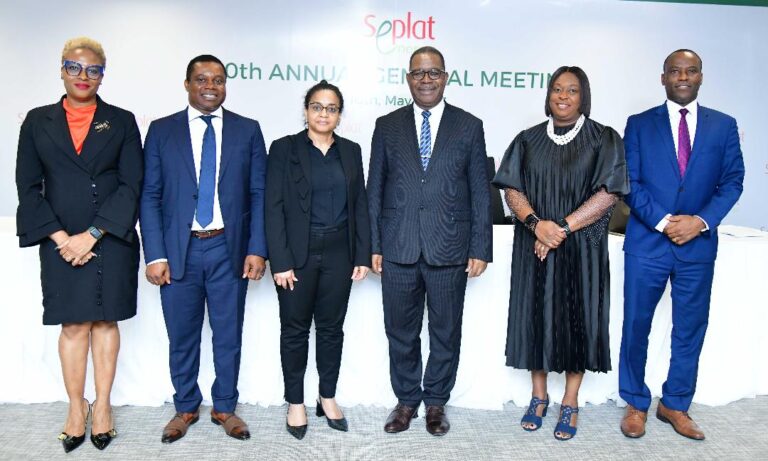Caption: From left, Chioma Afe, Director External Affairs & Sustainability, Seplat Energy Plc; Chief Operating Officer, Sam Ezugworie; Vice-President, Finance, Eleanor Adaralegbe; Board Chairman, Basil Omiyi; Company Secretary/General Counsel, Edith Onwuchekwa; and New Energy Director, Effiong Okon, at the Seplat Energy 10th Annual General Meeting (Virtual) … on Wednesday.
Seplat Energy Plc, a leading Nigerian independent energy company listed on both the Nigerian Exchange Limited (NGX) and the London Stock Exchange (LSE), on Wednesday, May 10, 2023, held its 10th Annual General Meeting (AGM) attended virtually by shareholders, regulators, company directors, and the media, amongst other stakeholders.
Addressing the meeting, Basil Omiyi, the board Chairman, said for the 2022 full year, the Company’s total revenue rose by 29.8 per cent to $951.8m while profit before tax rose by 15.3% to $204.4m.
With the healthy financial performance and solid cash position, the shareholders at the meeting approved the US 15 cents per share dividend payout recommended by the directors broken down a special dividend of US5 cents per share, in addition to the final quarterly dividend of US 2.5 cents per share, payable May 16, 2023 to shareholders whose names appear in the Company’s Register at the close of business on April 18, 2023.
Omiyi said the company’s oil business started the year on a strong footing, with working interest production of 29,078 barrels of oil per day (bopd) and 30,338bopd in Q1-2022 and Q2-2022 respectively, adding that: “However, in the third quarter, production was impacted negatively by evacuation problems at the Forcados Oil Terminal (FOT), not being available for a period.
“Thankfully, the much-delayed launch of the Amukpe-Escravos Pipeline (AEP) provided some relief as we were able to flow c.10,100bopd (working interest production) during the period. The AEP is now a major export route for our largest assets at OMLs 4, 38 and 41. As a result, our reliance on the Trans Forcados Pipeline and FOT is significantly lower, reducing risks of downtime while providing a solid base for stronger export volumes and revenues.”
According to him, Seplat’s gas business remained strong through the year, as good progress was made with the construction of the ANOH Gas Processing Plant, which now awaits the completion of third-party infrastructure before it can commence operations, projected for the final quarter of 2023.
“The positive impact of renegotiated Gas Sales Agreements (GSAs) in H2-2022 provided healthy support for revenue growth and profitability and we continue to focus on increasing capacity utilisation at our Oben Gas Processing Plant,” he added.
Over the past 12 months, Omiyi said the company had taken significant steps towards fulfilling its new purpose and vision with regards to energy transition, and was scaling up its Midstream Gas business to increase the amount of natural gas supplied towards powering Nigeria’s electricity grid thereby displacing diesel use in power generation, while the Company’s New Energy business has been tasked with developing power and renewable energy.
Omiyi explained: “at the same time, we have strengthened our approach to understanding and evaluating climate risk, which we have re-designated as a key risk to our business.
“We have adopted a new Board-approved Climate Change Policy and have advanced a major component of our decarbonisation strategy: eliminating routine flaring by the end of 2024 through our Flares Out initiative, which is six years ahead of Nigerian regulatory requirements and the World Bank’s initiative to achieve Zero Routine Flaring by 2030.
“These steps form part of a transition plan that will align our business strategy with the overarching goal of the Paris Agreement to limit mean global temperature rise to well below 2°C and contribute to supporting Nigeria’s pathway to achieving carbon neutrality by 2060. This plan is subject to evaluation, approval and oversight of our Board and Management teams and is underpinned by actionable, specific initiatives for decarbonising our operations and increasing the overall sustainability of our business model.”
Reacting, Patrick Ajudua, a shareholder, commended the company for the special and final dividends, expressing gratitude and appreciation to “the board for being consistent in dividend payment and ensuring a generous reward to the shareholders at a very difficult time, when most companies are even finding it difficult to maintain profitability.”
Matthew Akinlade, another shareholder and President, Noble Shareholders Solidarity Association, also commended “the board and management for a good performance, in spite of the challenges of year 2022, you were able to raise revenue by about 38% and cost of sales at just 18%, which shows an effective management of the company’s cost.”
Speaking at the meeting, the Chief Operating Officer, Seplat Energy, Samson Ezugworie, noted that “as part of Seplat Energy’s drive to become a leading supplier of lower carbon and renewable energy, we are exploring ways to expand into these new and exciting markets. The first and most obvious option is to provide more gas for Nigeria’s power sector, to reduce the country’s reliance on imported diesel fuel, which is highly carbon intensive and a drain on the nation’s wealth.
“We will also look at hybrid systems where we install solar or other renewable technology alongside gas, which will provide baseload power at all times,” he added.








